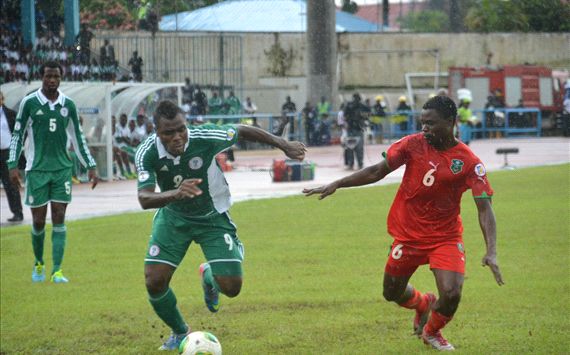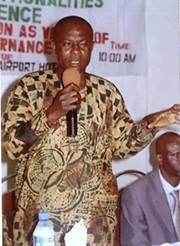Nigeria is neo-colonizing Black Africa!
 As
I already expect, after reading the headline and without the intricate
understanding of the thoughts behind it, some Africans might in the
spirit of patriotism scream in anger “Never, Nigeria can never colonize
us! At face value, others might go beyond anger to hatred and disdain
from just the article to the writer. On the other hand, there might also
be Nigerians screaming, “Yes, very true, you have said it the way it
is, we are colonizing them!”
As
I already expect, after reading the headline and without the intricate
understanding of the thoughts behind it, some Africans might in the
spirit of patriotism scream in anger “Never, Nigeria can never colonize
us! At face value, others might go beyond anger to hatred and disdain
from just the article to the writer. On the other hand, there might also
be Nigerians screaming, “Yes, very true, you have said it the way it
is, we are colonizing them!”
But whatever, the position or mood, I
honestly would be quick to say that those who would support or oppose
me or the article by just reading the headline will both be wrong in
their judgment without reading the whole article to understand the
reasons behind my assertions. At this juncture, it would be most
appropriate for me to begin to put the issues in proper perspective and
provide necessary explanations for what I have said.Historically, the 1500s to the mid-1900s saw several European powers particularly, but not exclusive to Portugal, Spain, Britain, the Netherlands, Italy and France established colonies in Asia, Africa, and the Americas. From their activities, the term colonialism became referred to as the establishment, exploitation, maintenance, acquisition, and expansion of colonies in one territory by people from another territory. One basic practice evident among these colonial powers during this period was their quest to physically occupy their colonies.
For the people of black Africa, the activities of Nationalist like Edward Wilmot Blyden, Herbert Macaulay, Benjamin Nnamdi Azikiwe , Kwame Nkrumah, Julius Kambarage Nyerere, Nelson Mandela, Chief Obafemi Awolowo among others who spoke and fought against colonialism, led to the independence of the first set of countries like Ghana in 1957 and Nigeria in 1960, as well as end of the apartheid regime in south Africa in 1994. Today, virtually all the countries in the African continent are free from European occupation and dominance, but are they all free from colonialism? There are those who still argue that former European powers as well as the united state exercise some form of control under a new term known as “neo-colonialism” which is likened to be a form of colonalisation without direct physical occupation of the colony but based mainly economic and cultural influences. it is on this new understanding that my argument is based.
Africa today is divided majorly among French and English speaking countries alongside the Arab countries up North. In West Africa for instance which comprises of Benin, Burkina Faso, Cameroon, Cape Verde, Chad, Côte d’Ivoire, Equatorial Guinea, The Gambia, Ghana, Guinea, Guinea-Bissau, Liberia, Mali, Mauritania, Niger, Nigeria, Senegal, Sierra Leone, and Togo, there is a vast sense of western culture which over the years have been part of the life of the people of this region.
But in recent years, one cannot ignore certain visible changes necessitated particularly in the business and entertainment industries. Unlike the colonization era where Africa depended on the west and its media for entertainment, food, shelter and modernization, things are fast changing as the people are beginning to look inward, and somehow their needs are being satisfied by countries like Nigeria and its people.
Growing up in Nigeria as a young boy, the craze for American culture, slangs, music, movies and lifestyle was everywhere. As children, we would sing along to American songs from the likes of 2 Pac, Snoop Dogg, Dr Dre and other popular American acts even though we could not understand properly the meaning of what they said. To be able to sing American songs made you the guy everybody wanted to hang out with. To dress the American way made sure you weren’t ignored at any party. To speak with an American accent brought you closer to the girls, and to look like an American “Oyibo” gave you almost everything even without asking.
Till today, many Nigerians will attest to Hollywood’s influence in the Nigerian society. A journalist friend once said to me, “Nigerian music industry gained Independence from America in 2004 as a result of the scuffle between Idris Abdulkareem and American rapper 50 Cent on board an airplane at Murtala Mohammed International Airport in Lagos when he protested the second class treatment given to Nigerian musician by cooperate outfits.” By media accounts, Abdulkareem had tried to occupy 50 Cent’s seat, resulting in a fight between Abdulkareem, his friends, and 50 Cent’s bodyguards. Whether his statement is valid or not, one thing is certain, between 2004 to today, so much have changed in the Nigerian entertainment industry both locally and internationally.
Between July to September 2013, I was opportunied to visit Benin Republic, Togo and Ghana. I am still amazed by what I encountered during my stay in these African countries. Beyond the beautiful beaches, affordable food, clothes and accommodation, one particular experience that struck me was the preferences given to Nigerian culture, music, movies, lifestyle and its people. There I was, in Benin Republic – a French speaking neighbor of Nigeria, just about an hour from Lagos; the commercial capital of the country, Nigerian culture, her movies and music were the rave of the moment.
During, my journey from Seme – a town in Benin Republic to Lome – the capital of Togo, the Driver of the taxi repeatedly played Nigerian music from artists like P-square to Tu- Face, to D-banj, Wizkid, Iyanya, and Flavor down to Nigerian songs I personally didn’t even know or could recognize the artists behind them. Ironically, neither the driver nor other co-travelers could understand English or (Pidgin English), as they earlier had to seek for translator at the Car park to tell me I was going to get my “change” when we got to our destination. But as the music played, some people in the car nodded in affirmation while others graciously sang along.
At Ghana, another English speaking country which has over the years struggled to rival Nigeria in football and other international events, the atmosphere and appreciation for Nigeria was not much different from Togo and Benin. One might assume that I might be biased while taking into account my excellent English proficiency as against other languages, but I still would argue that it is not far from the truth to say that the appreciation of Nigeria in Ghana cannot be rivaled by any other country in Black Africa. One reason for this argument is the place of Ghanaian culture and pride in the social life of the people. Ghanians are proud of their culture, music, heritage and their “Flag”. But regardless, they are in the same vain passionate about Nigerian music, movies, culture and its people.
Apart from the music and movies, another interesting aspect I enjoyed was going shopping at the markets in Togo and Benin Republic. I virtually went there every day and every time possible to get something new because the prices were incredibly affordable compared to what was obtainable in Nigeria. The markets in these countries had many similarities like the ones in Nigeria – very noisy, filled with so many people and a dirty environment. But most interestingly, one striking similarity that encouraged me to come every other day was that majority of the traders I encountered there were Nigerians.
It was shocking for me at first to notice that many of the big shops in the markets I randomly visited in French speaking countries like Togo and Benin Republic could be owned by Nigerians. I just couldn’t understand it. But regardless of what or how I felt, it was the reality. In front of many shops were huge speakers playing Nigerian music as people went about their daily business of buying and selling. I had been briefed by a friend before my visit that I must talk, act and behave like I was a local; else once they knew I was a Foreigner, they will charge me higher prices than normal. Having been told, I had made up my mind to think, act, and talk like the local people.
But unfortunately, the moment I opened my mouth to ask for an item, the shop owner replied me in English, and went further to ask me “How far my brother, how you dey?”. At that point, I could no longer keep up with my “acting local”, because he obviously knew I was Nigerian and had spoken to me in “Pidgin English”.
Similar experiences played out in Madina Market, Accra, as well as other exotic places I had visited during my stay there. There were so many Nigerians and they could sense I was Nigerian even before I opened my mouth. Those who were not Nigerians wanted to associate with me than just business or act friendlier on account that I was a Nigerian.
When Nigerian musical artist visit many of these African countries, the love they get is never commensurate to what or how they are treated in Nigeria. Whether in Cameroon, Kenya, Liberia, Malawi, South Africa, Zambia, Zimbabwe, Nigerian businesses, art and culture have continue to strive alongside and above what is available in many of these countries. For Instance, Cameroon a bi-lingual country with French and English as its official languages and shares a border with in Nigeria in the south is said to be a country of diverse culture and people. But while many Nigerians, cannot and might never know or recognize a musician, a movie or a cultural act from this country, the people of Cameroon go crazy over Nigerian music and movies regardless of the linguistic differences.
In the 21st century, military occupation as evident in the colonial period has become unpopular and to a great extent unrealistic making colonialism impossible. However, cultural as well as economic superiority are the new defining characteristics of a new form of colonialism. If the term is realistic, then there is more than enough reality proving that Nigeria is neo – colonizing Black Africa!











 News
News Monday, August 19, 2013
Monday, August 19, 2013




